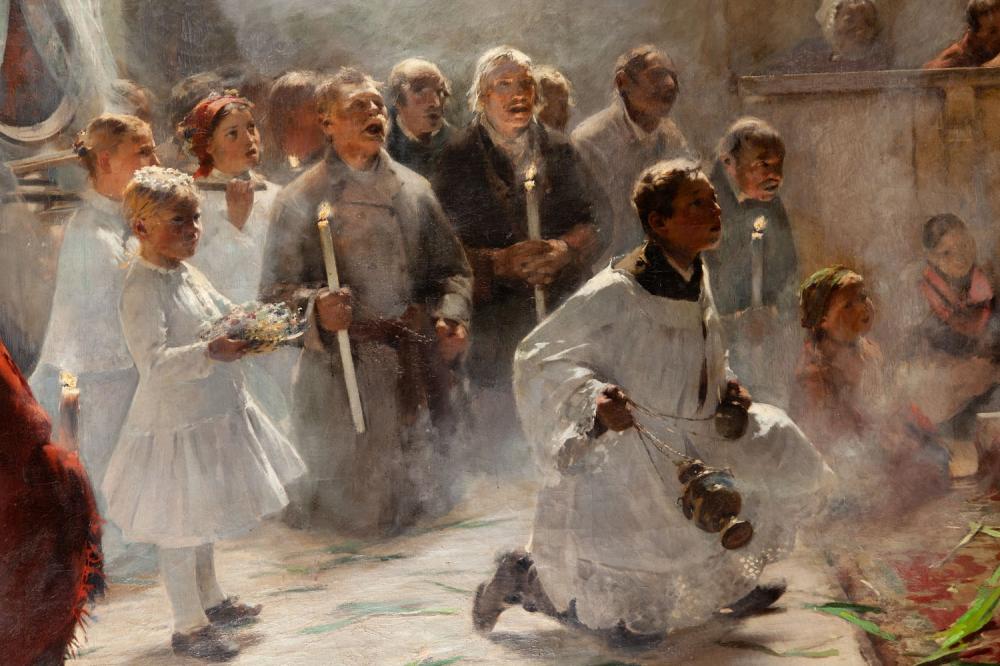Reprove, entreat, rebuke

13 Jan. 14 May. 13 Sept.
For the Abbot in his doctrine ought always to observe the bidding of the Apostle, wherein he says: “Reprove, entreat, rebuke”; mingling, as occasions may require, gentleness with severity; shewing now the rigour of a master, now the loving affection of a father, so as sternly to rebuke the undisciplined and restless, and to exhort the obedient, mild, and patient to advance in virtue. And such as are negligent and haughty we charge him to reprove and correct. Let him not shut his eyes to the faults of offenders; but as soon as they appear, let him strive with all his might to root them out, remembering the fate of Heli, the priest of Silo. Those of good disposition and understanding let him, for the first or second time, correct only with words; but such as are froward and hard of heart, and proud, or disobedient, let him chastise with bodily stripes at the very first offence, knowing that it is written: “The fool is not corrected with words.” And again “Strike thy son with the rod, and thou shalt deliver his soul from death.”
Saint Benedict refers here to Saint Paul’s instructions in 2 Timothy 4:1–5. The text of the Rule and the text of Saint Paul must be read together, allowing the light of one to illuminate the other.
I adjure thee in the sight of God, and of Jesus Christ, who is to be the judge of living and dead, in the name of his coming, and of his kingdom, preach the word, dwelling upon it continually, welcome or unwelcome; bring home wrong-doing, comfort the waverer, rebuke the sinner, with all the patience of a teacher. The time will surely come, when men will grow tired of sound doctrine, always itching to hear something fresh; and so they will provide themselves with a continuous succession of new teachers, as the whim takes them, turning a deaf ear to the truth, bestowing their attention on fables instead. It is for thee to be on the watch, to accept every hardship, to employ thyself in preaching the gospel, and perform every duty of thy office, keeping a sober mind.
This part of Chapter II is a kind of catalogue of the virtues that an abbot must have, and of the vices that he is likely to find in troublesome monks. The abbot, for his part, must be gentle and severe, rigorous and lovingly affectionate, stern to rebuke, ready to exhort, clearsighted in unmasking faults, capable of correcting those of good will with words, and of applying corrective action to the hard–hearted. As for troublesome monks, they will invariably include the undisciplined and the restless, the negligent and the haughty, the contrary and the hard of heart, the proud and the disobedient. Saint Benedict writes here out of a long experience of monastic life. The qualities that he wants to see in an abbot are the very ones that he himself had to cultivate. The faults and vices that he identifies are the very ones that he, as a physician of souls, was obliged to treat again and again. The passage of centuries has changed nothing.
One might turn this passage of Chapter II into a prayer. Saint Aelred of Rievaulx did exactly this in his famous Pastoral Prayer.
Sweet Lord, I pray you, is not this your family, your own peculiar people, that has been led by you out of the second Egypt, and by you has been created and redeemed? . . . You have gathered them together out of all parts, and made them live together in a house where all men follow a common way of life.
Hear me, therefore, hear me, 0 Lord my God, and let your eyes be open on them day and night. Spread your wings, most loving Lord and shield them stretch forth your holy right hand, Lord, and bless them; and pour into their hearts your Holy Spirit, that he may keep them in unity of spirit and the bond of peace, chaste in their bodies, lowly in their minds. May he be there to help them when they pray, and fill them with the unction and the riches of your love.
May the same loving Comforter, when they are being tempted, come swiftly to their aid; and may he help their weakness in all the straits and troubles of this life. By the same Spirit make them, Lord, to be, within themselves, with one another, and towards myself peaceable and equable and kind, obedient, serviceable, helpful, to each other. May they be fervent in spirit, rejoicing in hope, enduring steadfastly through poverty and fasting, toils and vigils, silence and repose.
Drive far from them, O Lord, the spirit of pride and of vain glory, of envy and of gloom, of weariness and slander, of distrust and despair, of fornication and uncleanness, of discord and presumption. Be in their midst, according to your faithful promise. And, since you know what each of them needs, I pray you, strengthen what is weak in them. spurn not their frailty, heal that which is diseased, give joy for sorrow, kindle what is lukewarm, establish what is insecure in them, that each of them may know he does not lack your grace in any of his trials and temptations.
I, for my part, commit them into your holy hands and loving providence. May no one snatch them from your hand, nor from your servant’s, unto whom you have committed them. May they persevere with gladness in their holy purpose, unto the attainment of everlasting life with you, our most sweet Lord, their Helper always, who live and reign to ages of ages. Amen.

